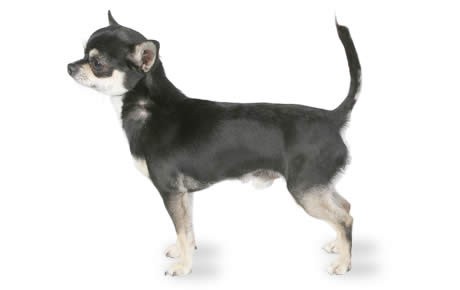Chihuahua Breed Guide

Breed Group:
Companion Dogs
Get 30% off
Join our Newsletter
Sign Up Today
Chihuahua History & Breed Background
Although there are many different claims of where the Chihuahua originated from, many believe Mexico was their initial birthplace.These dogs are one of the smallest breeds in the world and have several unique markings and colors.
They are also classified into two different families as either short or long-haired Chihuahuas. Big bold eyes, pointy ears, and a petite body are the main characteristics of the Chihuahua. Their high level of intelligence is also one of their many beloved traits of this playful breed.
Chihuahua Personality & Behavior
This breed makes up what they are lacking in size, with their exploding personalities. They are the perfect combination of both sassy and charming, which gives them a one-of-a-kind character.
Chihuahuas are loving dogs and usually find close companionship with an individual person. Even though they are small in size, their alertness makes them a great watchdog.
Chihuahua’s are a smart breed that is trainable with patience and persistence. They need to be mentally stimulated as often as possible. All in all, this dog craves affection and is a great pet for any household.
Are Chihuahuas Hard to Train?
Chihuahua’s are an intelligent breed, but that doesn’t mean that they are always the easiest to train. It’s recommended to start the training process as early as possible. Have them familiarized with different people, places, sounds, and experiences so they develop into a well-mannered pet.
For a helpful tip, try using positive reinforcement when training your Chihuahua. Lastly, Chihuahuas strongly benefit from obedience and agility training.
Exercise Requirements for Chihuahuas
Because this breed is so small, they require little exercise. Daily walks are enough to fulfill their recommended amount of physical activity. Take note that this breed does not do well in cold weather, so make sure to put them in a sweater if walking in the colder seasons.
Lifespan of Chihuahuas
The Chihuahua has a surprisingly long lifespan of 13-17 years. This is significantly longer than most breeds, and that is probably due to their petite size.
Are Chihuahuas a Popular Breed?
According to the American Kennel Club, the Chihuahua is the 30th most popular breed in the U.S. today. Their bold and loving personalities make them a favorite for many pet owners.
Feeding Requirements for Chihuahuas
A Chihuahua needs very little food to keep them healthy. ¼-½ cups of high-quality food split into two meals is sufficient enough for their daily intake. Always keep in mind to have fresh water readily available at all times.
How to Groom a Chihuahua
Both the long and short-haired varieties require little maintenance. For long-haired Chihuahuas, weekly brushing is highly recommended. It is also important to trim their nails every couple of weeks to avoid breakage or cracking.
Are Chihuahuas Good With Children?
Chihuahuas get along with children just fine, however, problems can arise if both the child and the dog are of similar size. It is not recommended to have a Chihuahua if a toddler is in the household. Because of their fragile size, a child can easily injure the dog if handled incorrectly. If you already have both a Chihuahua and a small child under the same roof, make sure to closely supervise any interaction. Early socialization for the Chihuahua is very important to teach them how to behave with humans and other animals.
Chihuahua Health Issues
- Two merle-patterned Chihuahuas should never be bred to one another as any offspring with two copies of the merle (M) gene can have serious hearing, visual and heart problems.
- Caesarean section: Due to their fragile build, giving birth for a Chihuahua can be very dangerous. About one-third of litters are delivered by a caesarean section.
- Molera: A Molera is a soft spot on the top of the head. This occurs because their skulls do not tightly stay together as it normally should. A Molera is considered a normal issue within the breed. Extra care and caution must be taken so the dog doesn’t become injured which can lead to serious damage.
- Hydrocephalus: This health issue is found in Chihuahuas at an increased incidence compared to other breeds. Hydrocephalus occurs when cerebrospinal fluid builds in the head, causing pressure to the brain. In severe cases, this can cause pain or loss of functionality to the brain.
- Legg-Calve-Perthes disease: A condition of small dogs in which the head of the femur bone degenerates in early life. is extremely common in Chihuahuas compared to other breeds. This leads to joint and bone inflammation.
- Patellar luxation: Patellar luxation occurs when the kneecap slips out of position causing dislocation. 6% of Chihuahuas are prone to this problem and if gone untreated may cause lameness.
- Collapsing trachea: This occurs when the cartilage rings of the trachea lose their shape, causing breathing problems. A collapsing trachea is very common in small breeds.
- Liver shunts: Liver shunts are a birth defect that results when blood is diverted in a vessel within the liver. This can also occur right outside the liver as well.
- Pulmonic stenosis of the heart: This occurs when there are restrictions of blood flow within the heart chambers. Therefore the heart has to work harder, which can result in heart failure. Other conditions seen at a slightly increased rate are bladder stones, chronic valvular disease of the heart, cryptorchidism, cleft palate, umbilical hernia and dental occlusion defects.
Other Resources
National Breed Website: Chihuahua Club of America
Rescues: Chihuahua Rescue
Health Issues Associated with this Breed:
- Anxiety
- Collapsed trachea
- Encephalitis
- Heart Murmurs
- Hydrocephalus
- Hypoglycemia
- Inflammation
- Kidney Stones
- Open Fontanel
- Pain
- Patellar Luxation
- Periodontal Disease
- Progressive Retinal Atrophy (PRA)
- Pulmonic Stenosis
- Separation Anxiety
- Shivering





